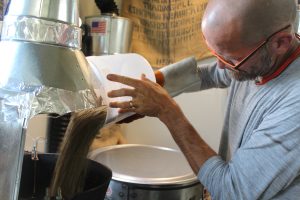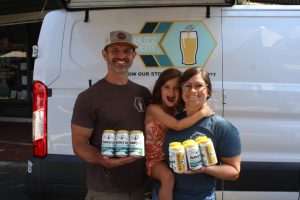
Jeffery Smith pours coffee beans into his iron skillet for roasting.

Brett and Meghan Hines with their daughter Kenna at the Berlin Farmers Market with their new mead, Honey Lit.
By Cindy Hoffman, Staff Writer
(Aug. 24, 2023) Jeffrey Smith, of Iron Skillet Coffee in Berlin met Emiliano Espinosa, Chesapeake Agriculture Innovation Center’s (CAIC) program director at a farmer’s market in Ocean City, where he was selling his coffee.
Espinosa told Smith about a new program he was running at CAIC, which helps entrepreneurs build up their businesses. It seemed too good to be true, but it wasn’t.
The program caters to value added producers, described as farmers who grow their own produce or aquaculture product, and consumer packaged goods companies, which make food products.
Smith signed up for their start-up program, and last year, was one of eight small businesses that participated in their first Producers Growth Program.
Meghan and Brett Hines of Buzz Meadery, a Berlin company that makes and sells mead using local ingredients, also participated in the CAIC program. Both companies launched in 2020.
CAIC has opened enrollment for their next round of the Producers Growth Program. Applications will be accepted until the end of September.
“The program was hugely beneficial to helping us plan our growing business. It gave us specific metrics and ideas that we could implement to scale strategically while balancing the business financially and practically,” said Meghan Hines.
Smith said he was able to see his company through the program in a way he had never envisioned seeing it.
“I saw how it could become more than me.”
Before he participated in the CAIC program, he assumed he would be selling his coffee in a coffee shop. That is not part of his vision now.
Smith is focusing on selling his coffee wholesale to local restaurants in town. It is already offered at Blacksmith, June and Juice, Forgotten 50 Distilling, 5 Tides in Assateague State Park, and Two Scoops in Salisbury.
The cost of the program to “value added producers” is $2,000, with much of the expense for farmers paid for by the U.S. Department of Agriculture. “Consumer packaged goods companies,” like Iron Skillet Coffee and Buzz Meadery pay $5,000. This can be paid in installments.
The six-month-long program teaches participants about scaling, risk assessment and management, supply chain and logistics, and how to develop a growth plan. Participants tour sites, including a regional food accelerator (an organization that helps new food businesses reach their potential more quickly) , a co-packing facility and a leading grocer’s warehouse to meet with owners and connect with fellow producers.
“One of the most beneficial parts of the experience was visiting multiple businesses on field trips, where we could see real life applications of what we had learned. It helped us network with industry professionals and those relationships have helped us still today,” Hines said.
Smith said he got so much more out of the program through the various experts that were available to him.
“We met directly 1:1 with multiple mentors throughout the program, which helped me apply what we had learned more effectively,” Hines said.
The program also offers legal consulting, graphic design services, bookkeeping, accounting and marketing consulting.
At the end of the program, participants showcase their products and share their growth plans with potential buyers and service providers.
“We introduce them to people who might be able to make connections for them or purchase their product,” said Espinosa.
To register for the program, candidates must be working full time in their businesses and be generating a minimum of $40,000 in annual revenue.
Candidates are interviewed by advisors to make sure they are the right fit for the program. Only eight people are accepted for each class, so they can receive one-on-one coaching.
“Getting clear on their vision and an actionable way to get there is the main value of this program,” Espinosa said.
“It’s a program where they do a lot of reflection and strategic thinking about their business. By the end of the program, they know where they are headed and how to get there.”
Smith said because of the program, he is looking to build and patent a machine to roast coffee the way he does, in an iron skillet. This is a traditional process he learned when he visited Ethiopia.
He plans to automate the process and commercialize it on a larger scale so others can do what he is doing.
A direct outcome of the program for Buzz Meadery is its newest mead, the Honey Lit, which the Hines released on Sunday at the Berlin Farmers Market.
Honey Lit is their first product to be sold in cans.
“For us, with our unique challenges, moving into the distribution space with cans was the best move we could make. This program helped us plan strategically how to scale,” Hines said.
For those who are in the start-up phase of their business, CAIC has programs available catering to their needs too.
For more information on their programs, visit caic.org
